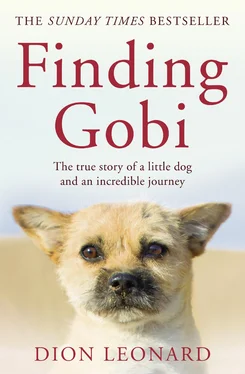These races are called “multi-stage ultras”, and it’s hard to think of a more brutal test of mental and physical toughness. People like me pay thousands of pounds for the privilege of putting ourselves through pure agony, shedding up to 10 per cent of our body weight in the process, but it’s worth it. We get to run in some of the remotest and most picturesque parts of the world, and we have the safety net of a dedicated support crew and highly trained medical crew on our side. Sometimes these challenges can be excruciating, but they’re also life changing, and reaching the finish line is one of life’s most rewarding experiences.
Sometimes things don’t go so well. Like the last time I tried to run six marathons in a week. I ended up in the middle of the pack, in agony. At the time it felt terminal, as if I’d never compete again. But I recovered just enough for one last shot. If I could run well in the Gobi race, maybe I’d yet have some more running in me. After all, in the three years since I’d taken up running seriously, I’d found out how good it felt to be on the podium. The thought of never competing again made me feel queasy inside.
If things went wrong, as they had for another competitor in the same race a few years back, I could end up dead.
According to the Internet, the drive from the airport to the hotel was supposed to take twenty or thirty minutes. But the closer we got to the hour mark, the more agitated the driver became. He had started out grouchy when he realized I was an English-speaking tourist and quoted me a price three times as much as I was expecting. It had got only worse from there.
By the time we pulled up outside a redbrick building, he was waving his arms and trying to shove me out of the cab. I looked out the window, then back at the low-resolution image I’d shown him before we started the journey. It was kind of similar if you squinted a bit, but it was obvious that he hadn’t brought me to a hotel.
“I think you need some glasses, mate!” I said, trying to keep it light and get him to see the funny side. It didn’t work.
Begrudgingly, he picked up his phone and yelled at someone on the other end. When we finally made it to my destination twenty minutes later, he was livid, shaking his fists and burning rubber as he sped away.
Not that I’d been bothered. As much as ultra-running batters your body, it also assaults your mind. You learn pretty quickly how to block out distractions and mildly annoying things like lost toenails or bleeding nipples. The stress coming from an enraged taxi driver was nothing I couldn’t ignore.
The next day was a different story.
I had to travel a few hundred miles out of the city by bullet train to get to the race headquarters in a large town called Hami. Right from the moment I arrived at the station in Urumqi, I knew I was in for a journey that would test my patience.
I’d never seen such security at a train station. There were military vehicles everywhere, temporary metal roadblocks funnelling pedestrians and traffic past armed guards. I’d been told to allow myself two hours to get on the train, but as I stared at the great tide of people ahead of me, I wondered whether it was going to be enough. If the previous day’s taxi ride had taught me anything, it’s that if I missed my train, I wasn’t sure I could overcome the language barrier and re-book another ticket. And if I didn’t get to the race meeting point that day, who knew if I would even make the start?
Panic wasn’t going to help me get anywhere. I took control of my breathing, told myself to get a grip, and shuffled my way through the first security check. By the time I cleared it and worked out where I needed to go to collect my ticket, I discovered I was in the wrong queue. I joined the right one, and by then I was way down on my time. If this was a race , I thought, I’d be at the back . I never ran at the back.
Once I had my ticket, I had less than forty minutes to clear another security check, have my passport stared at in forensic detail by an over-eager policeman, force my way to the front of a line of fifty people waiting to check in, and stand, open-mouthed, panting and staring frantically at signs and display boards I couldn’t read, wondering where the heck I had to go to find the right platform.
Thankfully, I wasn’t entirely invisible, and a Chinese guy who’d studied in England tapped me on the shoulder.
“You need some help?” he said.
I could have hugged him.
I just had time to sit down at the departure point when everyone around me turned and watched as the train crew swept past us. It was like a scene out of a 1950s airport, the drivers with their immaculate uniforms, white gloves, and air of complete control, the stewardesses looking poised and perfect.
I followed them onto the train and sank, exhausted, into my seat. Almost thirty-six hours had slipped by since I left home in Edinburgh, and I tried to empty my mind and body of the tension that had built up so far. I looked out the window for something to interest me, but for hours on end the train just sliced through a bland-looking landscape that wasn’t cultivated enough to be farmland and wasn’t vacant enough to be desert. It was just land, and it went on for hundreds and hundreds of miles.
Exhausted and stressed. This was not how I wanted to feel this close to the biggest race I’d faced so far in my short running career.
I’d taken part in more prestigious events, such as the world-famous Marathon des Sables in Morocco, universally agreed to be the toughest footrace on earth. Twice I’d lined up alongside the thirteen hundred other runners and raced across the Sahara Desert as the temperature topped 125 degrees in the day and sank to 40 at night. I’d even finished a respectable thirty-second the second time I ran it. But fifteen months had passed since then, and a lot had changed.
I had started taking note of the changes during another 155-mile race across the Kalahari Desert in South Africa. I’d pushed myself hard—too hard—to finish second overall, my “first-ever podium finish” in a multi-stage. I’d not kept myself hydrated enough, and, as a result, my urine was the color of Coke. Back home my doctor said I’d caused my kidneys to shrink due to the lack of liquid, and all that running had left them bruised and resulted in blood in my urine.
A few months later I’d started having heart palpitations during another race. I could feel my heart beating wildly, and I got hit by a double blow of queasiness and dizziness.
Both those problems flared up again almost as soon as I started the Marathon des Sables. Of course, I ignored the pain and forced myself through it, all the way to a top-fifty finish. Trouble was, I’d pushed myself so hard that as soon as I got home, my left hamstring went into violent and agonizing spasms every time I tried to walk, let alone run.
For the first few months I rested; then for the next few I was in and out of physiotherapists’ consultation rooms, all the time hearing the same-old same-old: I just needed to try whatever new combination of strength and conditioning exercises they were suggesting. I tried them all. Nothing helped me to run again.
It took the best part of a year to find a physiotherapist and a coach who both had running expertise and knew what was going on to discover the truth: part of my problem was that I wasn’t running correctly. I’m tall—well over six feet—and while my long, steady, loping stride felt easy and natural, I wasn’t firing up all the muscles I should have been using, so I had sharp, painful spasms in my legs every time I ran.
The race in China was my first chance in a tough competition to try out my new, faster, shorter stride. In many ways I was feeling great. I had been able to run for hours on end at home without pain, and I’d followed my usual pre-race diet better than I ever had before. For the previous three months, I’d avoided all alcohol and junk food, eating not much more than chicken and vegetables. I’d even cut out coffee, hoping that would put an end to the heart palpitations.
Читать дальше












